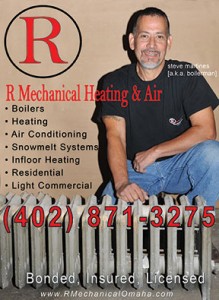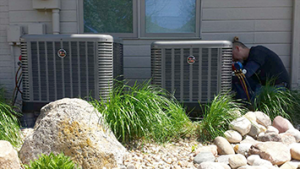 Air Conditioners: Installation, Service, and Repair
Air Conditioners: Installation, Service, and Repair
A good way to avoid problems with your home air conditioning system is to have it serviced every spring. Keeping your air conditioner clean will prevent expensive repairs and increase the efficiency and reliability of your unit, in addition to added life of the system and lower utility bills. We are dedicated to ensuring your comfort no matter the season and we service all makes and models of air conditioners.
An air conditioner that doesn't cool isn't a good thing in the Midwest. If your home isn't the cool sanctuary it should be, give R Mechanical Heating & Air a call. We are Omaha's air conditioning and home comfort experts!
The time to get ready for air conditioning season is in advance of when you need to start using it, so call R Mechanical Heating and Air today to set up an appointment for your annual 20-Point inspection (402) 871-3275.
We offer flexible appointments for your convenience and serve customers throughout Omaha, Council Bluffs, and the surrounding communities. Our 20-point air conditioning inspection is one of the most thorough AC service checks in the Omaha and Council Bluff's area!
 R Mechanical Heating & Air is a locally owned and operated family business with licensed and insured HVAC technicians who will take care of your air conditioner, whether for preventative maintenance or because of a problem or break down. Our expert technicians are on staff 24-hours a day, seven days a week if you have an immediate issue with your heating or cooling system.
R Mechanical Heating & Air is a locally owned and operated family business with licensed and insured HVAC technicians who will take care of your air conditioner, whether for preventative maintenance or because of a problem or break down. Our expert technicians are on staff 24-hours a day, seven days a week if you have an immediate issue with your heating or cooling system.
While you may want to leave some or all of your air conditioning cleaning to the experts at R Mechanical Heating & Air, there are a few things you can do to keep your air conditioner running.
AC odometerJust like your car, your home's air conditioning system needs periodical maintenance. If it had an odometer, it would be easier to track the miles you put on your air conditioner. It's recommended that you have your home'sair condtioning system tuned up before the cooling season to spot potential problems. Did you know that if you run your air conditioner all day at 78 degrees, it will remove approximately 10 gallons of water from the air that it circulates? Because of this, it's important to make sure your air conditioner's water line is clear and able to drain well. Call the experts at R Mechanical Heating & Air to make sure your air conditioning system can take the summer heat.
When an air conditioning unit sits idle over the winter months, collecting leaves and debris, a little bit of maintenance might be all that's needed to keep it running properly. But first, it's important to understand the basics of how an air conditioner works.
A central air conditioner consists of three main parts:
1. The condenser
2. The blower unit
3. The ductwork.
Did you know that leaky ducts waste energy?
The condenser is the large outdoor unit that is most likely located behind your house or garage. The condenser manages the temperature of the refridgerant, usually Freon, which travels back and forth from the house. The condenser does this by pressurizing the Freon gas as it arrives, turning it into a high-temperature liquid. The Freon then travels back to the house and to the blower unit.
Did you know that a ceiling fan may save you money?
Freon is changed into a gas and becomes dramatically colder after it enters the blower unit. This cold gas then gets piped through a coil located in the ductwork. Air blows through the coil, which is how it cools down before it continues into the house. The blower unit is constantly pulling air from the house through return ducts, forcing it through the cooling coil and then back to the house through supply ducts. After the Freon has done its job, it travels to the condenser, where it is pressurized back into a liquid, and the cycle starts again.
You should always leave your air conditioner's refrigerant lines to the professionals at R Mechanical Heating & Air. Before working on a central air conditioner, always turn off the power to the condenseSteve installing two new AC unitsr at the service panel. The condenser also typically has a 240-volt weatherproof disconnect box located near the unit; this contains a lever, fuses, or a circuit breaker to shut off the condenser. Turn this off, too. There are steps you can take to maintain your system, particularly before summer heats up.

